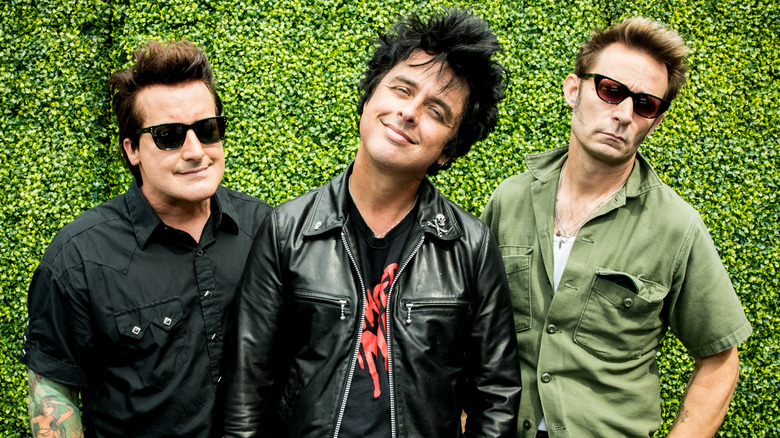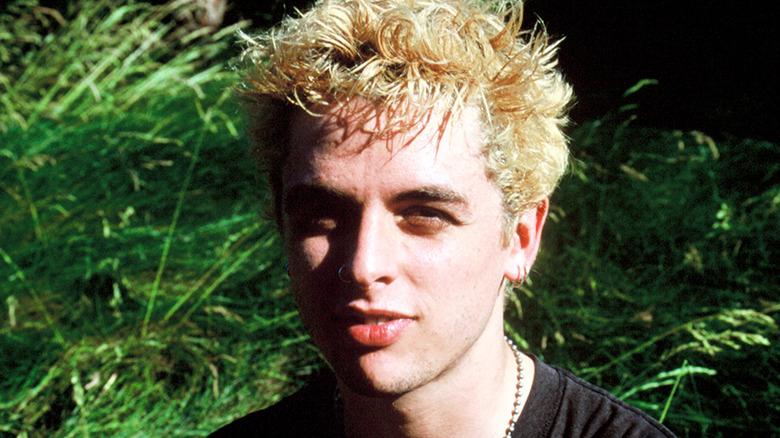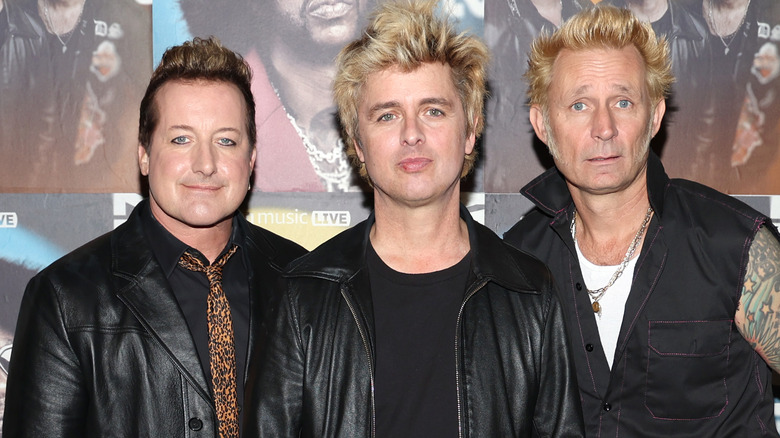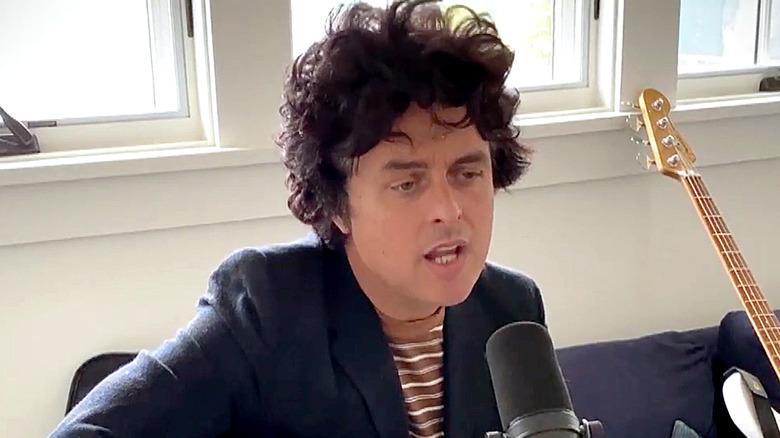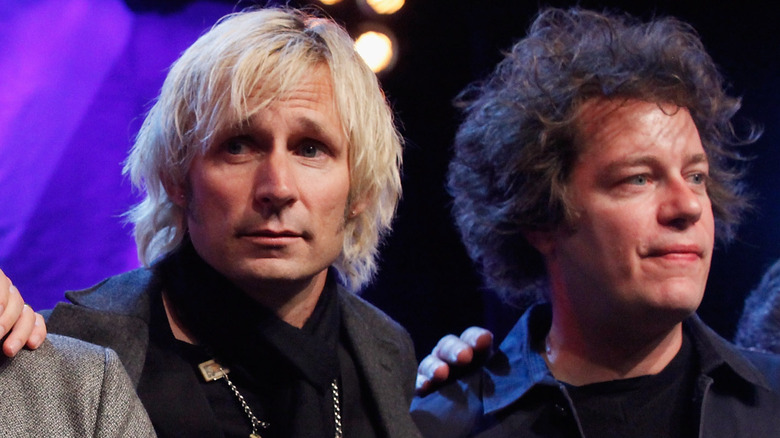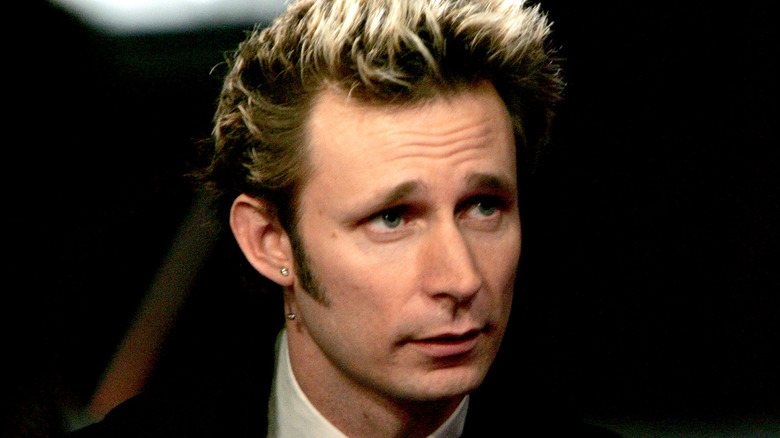The Tragic Real-Life Story Of Green Day
The explosive Northern California trio Green Day took the punchy riffs and anarchic attitude of classic '70s punk rock and made it mainstream and modern. Since busting out into the big time in 1994 with the bestselling "Dookie," Green Day's Billie Joe Armstrong, Mike Dirnt, and Tré Cool have evolved their band's sound into that of an accessible, boundary-pushing, globally influential straight-ahead rock n' roll act. It's been a long journey for the members of Green Day and their associates, and by no means has it been an easy one.
Along with the fame, stardom, money, adulation, and creative triumph that resulted from being the purveyors of contemporary standards like "When I Come Around," "Good Riddance (Time of Your Life)," "Boulevard of Broken Dreams," "21 Guns," and "Holiday," came abject horror, heartbreak, trauma, and loss. The subjects that inform Green Day's relatable tunes are rooted in real life for the pop-punk stalwarts. The personal and professional boulevard of broken dreams for Green Day is littered with tragic moments suffered by the band's musicians.
Billie Joe Armstrong's father died when he was young
When he was a 10-year-old fourth-grader, Green Day frontman Billie Joe Armstrong and his five siblings lost their father. Andrew Armstrong died in September 1982, shortly after he was diagnosed with cancer of the esophagus. Billie Joe's mother remarried two years after the death, and none of the children got along with their new stepfather. But shortly after his father's death, Billie Joe fell into a profoundly low period. "When kids were looking at me, it was almost like I had a ghost over my shoulder," he wrote in his Audible memoir, "Welcome to My Panic." "It was almost like my life started at zero again." At one point, he was so deep in the throes of grief and depression that he refused to leave his room. When asked by his mother to come out, he told her, "Wake me up when September ends."
That line remained in Billie Joe Armstrong's brain for more than 20 years, when it became the basis for Green Day's 2004 ballad "Wake Me Up When September Ends." "I think it's just something that stayed with me. The month of September always kind of being that anniversary," Billie Joe said of his father on "The Howard Stern Show." "I kind of avoided writing about him for many years and finally having a breakthrough like that ... felt good."
Mike Dirnt's mother was addicted to heroin
Within six weeks of his birth in May 1972, future Green Day bassist Mike Dirnt (real name: Michael Pritchard) was placed up for adoption. His biological mother, Carol Alba Rowland, was unable to care for her child, as she was addicted to heroin at the time. Raised by experienced parents established in California's foster home program, Dirnt was an excellent student despite often missing school to stay home and convalesce, his frequent bouts of sickness attributable to damage suffered in the womb of a mother who used drugs during pregnancy.
In January 2013, Dirnt announced on Green Day's website that his birth mother had died. The musician had only recently located and reconnected with Rowland. "Over the last 10 years I have sought her out with the help of a good friend, only to meet her one month before her passing!" Dirnt wrote (via Diffuser). "We were able to share a cup of coffee, a cigarette, and some smiles." Rowland died following a diagnosis of chronic obstructive pulmonary disease, and she suffered from dementia at the time of her death. "It didn't pan out to much more than a hug," Dirnt told the Associated Press of his one and only meeting with Rowland.
One of Green Day's biggest hits is about a friend who died tragically
Fresh off the release of their blockbuster LP "Dookie," Green Day could send even non-album cuts and soundtrack filler to the highest reaches of the Billboard charts. In July 1995, Green Day's contribution to the soundtrack of the flop teen movie "Angus," a song called "J.A.R. (Jason Andrew Relva)" topped the alternative rock chart and hit No. 22 on the pop chart. The namesake and subject of the song, Jason Andrew Relva, was a real person. He was a close childhood friend of Green Day's Billie Joe Armstrong and Mike Dirnt and hung out with the band during its earliest incarnation in the late 1980s, when the group called itself Desecrated Youth.
In 1992, Relva died from injuries suffered in a vehicular crash. "He was going 95," Dirnt explained to Spin. "I think he committed suicide." After Relva's passing, Dirnt got a tattoo on his arm consisting of a snake and dagger, modeled after one worn by the deceased.
The song memorializing their friend was important to the band, and it led to a fundamental switch in the band's operations. When Green Day's two managers leaked "J.A.R." to radio stations as part of a scheme to promote a new record label, the band fired them.
Tré Cool's real and maybe rumored injuries
In two separate instances, Green Day drummer Tré Cool seriously hurt himself, losing one body part and almost losing the use of another. During his childhood, the musician then known by his real name of Frank Wright III, was reportedly participating in a school assembly, showing off his unicycle-riding skills. But then there was a mishap as he rode the one-wheeled apparatus on a stage, landing so hard it pushed his scrotum painfully up into his body. While the musician didn't fully lose reproductive function (he's a father), it's rumored he lost one testicle incident, which may be the reason his speaking voice has a particularly high tone.
In 2002, Tré Cool was aggressively moving around to music — slam dancing, in the punk fashion and parlance — and managed to dislocate his knee. Doctors discovered that the joint and the rest of the leg had fully come apart, requiring surgery that also involved the removal of a bone fragment. It took the drummer six months to recuperate. "It's been rebuilt," Tré Cool told Spin (via Oh No They Didn't) of his knee. "I've got a piece of cadaver in there as a replacement."
Some master tapes were stolen and it undid the band
Green Day's core trio has stayed the same since 1990, but in the early 2000s, the band nearly ended. "Breaking up was an option," bassist Mike Dirnt told Rolling Stone. "We were arguing a lot and we were miserable. We needed to shift directions." Frontman Billie Joe Armstrong sensed that his bandmates viewed him more as a boss than as a collaborator, an unworkable situation. "To be in the greatest band in the world, we have to work on the small stuff," he said. Amidst that tension, Armstrong instituted weekly band therapy sessions. "Admitting that we care for each other was a big thing," drummer Tré Cool said. The openness led to musical experimentation, more than four months of recording, and a 20-track album called "Cigarettes and Valentines," virtually ready for release. Then it got stolen — the master tapes disappeared from the band's Oakland, California, studio.
For such a massive setback to occur in that tender time proved temporarily devastating. Armstrong abandoned his wife and two children to melt down alone in New York. He "drank a lot of red wine and vodka tonics," Armstrong said. "I was searching for something. I'm not sure it was the most successful trip." Rather than re-record the lost album upon his return to California, Armstrong instead pitched a new project — a politically charged LP with a loose story structure. That idea would evolve into 2004's "American Idiot."
Billie Joe Armstrong dealt with substance abuse problems
Billie Joe Armstrong of Green Day once considered himself a binge drinker, consuming mass quantities of alcohol particularly while under duress. He drank heavily during a month-long bender in 2003 and to cope with the stresses of starring in the Broadway adaptation of "American Idiot" around the same time that his band recorded "21st Century Breakdown." "I think I was just getting into a place where it was getting scary and that if it kept going, I would end up f***ing dead," Armstrong recalled in his Audible memoir "Welcome to My Panic."
By 2012, Armstrong's alcohol intake reached its peak in terms of quantity, frequency, and self-destruction. He'd also added powerful prescription medication to his regimen of substance abuse. "I couldn't predict where I was going to end up at the end of the night," he told Rolling Stone. "I'd wake up in a strange house on a couch. I wouldn't remember how. It was a complete blackout." In September 2012, after Green Day recorded three albums back-to-back-to-back, the band played an iHeartRadio-sponsored festival-style show in Las Vegas. When a light came on to warn Green Day that their slot was about to end, Armstrong, heavily inebriated and offended, grew upset. He launched into a profanity-laden tirade, destroyed his guitar, and walked off stage. The next morning, unable to recall much of what transpired on stage the night before, Armstrong returned home to California and enrolled in a drug rehabilitation facility.
Cancer hit Green Day twice in one year
Green Day's Mike Dirnt married Brittney Cade, his third wife, in 2009. Five years later, Dirnt announced on Green Day's Facebook page that Cade had just received a breast cancer diagnosis. Green Day took an extended hiatus in the mid-2010s, and Dirnt spent most of that time helping his wife through cancer treatments, which consisted of rounds of chemotherapy and nine surgical procedures. "She's doing great," Dirnt told the Associated Press in 2016. "She's in full remission." Cade tracked her treatments, numerous doctors' appointments, surgeries, and recovery through her Instagram, and she and Dirnt became public advocates for cancer research organizations.
The same year that one member of the extended Green Day family was diagnosed with cancer, so was another. Longtime band associate, touring member, and latter-day full-time second guitarist Jason White found out that he, too, had cancer. When White underwent a tonsillectomy in 2014, a doctor discovered cancerous tissue. "Thankfully they caught it early and he should make a full and speedy recovery," Green Day wrote in a statement on its website (via Rolling Stone). In 2015, White received the news that his tonsil cancer had gone into complete remission.
A performer died at a Green Day concert
Green Day was among the performers at the 2017 Mad Cool Festival, mounted in Madrid, Spain. Just before the band took the stage, an acrobat named Pedro Aunion Monroy performed in a container held aloft and above the audience with the aid of a crane. During his slot, Monroy fell out of the box, and he plunged about 100 feet to the ground. He was pronounced dead at the scene as a result of injuries sustained in the accident. Moments later, Green Day began its set, making no acknowledgment of Monroy's death because the band members hadn't been made aware of the tragic occurrence.
"Green Day did not hear about the accident until after our show was over," frontman Billie Joe Armstrong said in a statement (via Variety). "We didn't even know there was an acrobat performance at all. These festivals are huge." The only information the musicians had been given at the time of the death was that they needed to delay heading out on stage by 15 minutes, Armstrong said, "Because there was some sort of security issue." "We are heartbroken for his friends and family," Armstrong wrote of Monroy. "And we are also shocked and heartbroken for anyone that had to witness this tragedy."
Mike Dirnt's many divorces
Marital discord has darkened the life of Green Day bassist Mike Dirnt across the decades, in the relationship of his parents and throughout his own. Raised by adoptive parents Cheryl Nasser and Patrick Pritchard, the couple divorced when Dirnt was 7 years old. The split followed a lot of spousal fighting, and one episode, witnessed by Dirnt, ended with a visit from the El Sobrante, California, police department.
In 2002, Dirnt's first marriage ended abruptly, when his wife moved out of their home, along with their daughter, who was 8 years old at the time. The personal loss coincided with a professional one — the split occurred right around the time when the masters of an unreleased Green Day album were stolen out of a studio. Rather than re-record that album, Green Day got to work on what would become 2004's "American Idiot," a work overshadowed, for Dirnt, by personal problems. Remarried by that point, Dirnt's second wife told him that their marriage was over. "My ex-wife told me she was leaving me the day we finished the album," Dirnt told Rolling Stone. "When we mastered the record, I cried through the entire thing."
Mike Dirnt has been injured on stage a couple of times
To celebrate the 25th anniversary of 1969's monumental Woodstock music festival, concert organizers staged a similar event in Saugerties, New York, in August 1994. One of the biggest names on the bill was newly popular pop-punk band Green Day, which provided one of the most enduring images of Woodstock '94 when it engaged in a spirited mud fight with the crowd. By the end of the set, the members of Green Day were so caked in mud that it hindered their vision and mobility. Bassist Mike Dirnt collided with a member of the festival's security detail, stationed on the stage, which resulted in the sudden and violent expulsion of two teeth from his mouth.
That wouldn't mark the only time that Dirnt would hurt himself at a Green Day concert. Green Day played Los Angeles alternative rock station KROQ's Weenie Roast festival in June 1998, as did pop band Third Eye Blind. As Green Day played, intoxicated Third Eye Blind bassist Arion Salazar rushed the stage to give Dirnt a giant hug. Dirnt didn't know who Salazar was and fought him off with kicks and punches. An onstage fight ensued, and a fan contributed with a tossed beer bottle, which struck Dirnt's head. The Green Day musician was sent to a local hospital, where he was treated for a skull fracture.
